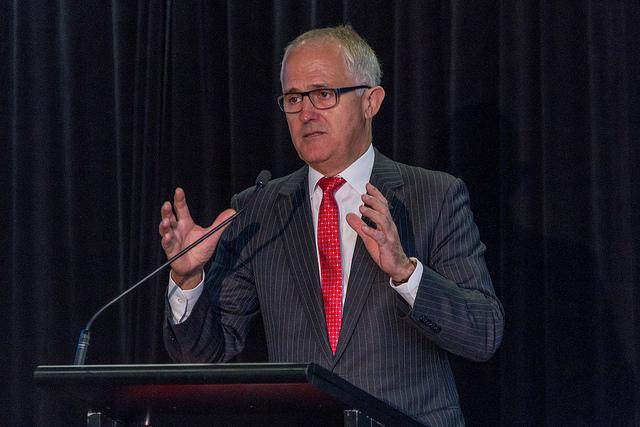Advice and decision: civil-military relations under the Turnbull government
Posted By Rod Lyon on December 21, 2015 @ 14:59
Twice now, within the space of a month, the government has signalled an unhealthy submissiveness to its security advisers. The first signal occurred in the National Security Statement. The second swirls through the recent media controversy over whether it was appropriate for ASIO director, Duncan Lewis, to ring two members of parliament (allegedly at the prime minister’s behest) to offer advice on combatting Islamic extremism. Both signals suggest a government lacking confidence on national security issues and over-reliant upon its advisers. It’s not the job of advisers to make decisions on behalf of government. Governments decide.
Let’s start with the National Security Statement [2]. Delivered by the prime minister in parliament on 24 November, the statement attracted favourable reviews for its breadth and thoughtfulness. But at one point it’s neither broad nor thoughtful. It says:
‘We will always proceed on the basis of the considered advice of our military professionals in the Australian Defence Force, just as we rely on the advice of our counter-terrorism experts domestically.’
Some might argue that the phrase ‘proceed on the basis’ is capable of diverse interpretation. But a plain reading of the text says the government intends doing what the ADF tells it to do. Moreover, on the issue of domestic terrorism it relies similarly on the advice of its counter-terrorism advisers. The context of the sentence in the NSS suggests the government will rely upon the ADF to make a decision about whether further Australian military deployments to the Middle East are appropriate. But that’s patently a political decision, not a military one.
The second piece of evidence is the transcript [3] of the prime minister’s press conference in Tokyo on 18 December. Here the prime minister is speaking off the cuff, but that makes his comments less processed and a little more revealing. Replies to several questions suggest that as prime minister, he, Malcolm Turnbull, relies heavily upon Duncan Lewis’s advice. That, of course, is his prerogative. But in the light of the earlier NSS remarks, some of the comments are interesting:
‘There are some people who like to write about terrorism. There’s some people like to express theories about terrorism, theories about religions and so forth. That’s they’re entitled to do that. Duncan Lewis he has actually fought against terrorism. He has led soldiers against terrorism. He is defending Australia today. He knows what he’s talking about and his advice should be heeded…[W]hen I say heeded, I mean listened to, respected. If people think they know better, fine, let them do so, it’s a free country but from my point of view, as the Prime Minister, I rely upon the advice of my security chiefs…’
Turnbull saves himself, in this case, by clarifying what ‘heeding’ means. But after doing so he promptly restates his reliance upon his security advisers rather than upon ‘theorists’. Actually, the proposition that military experience automatically trumps academic theorising is, at best, contestable. After all, the most successful Western strategy of the Cold War—containment—wasn’t devised by a military general but by a diplomat-cum-political scientist, George Kennan.
It is, of course, still early days in the Turnbull government. And the swapping over of defence ministers as well as prime ministers has, for now, left the government light on national security expertise within its ministerial ranks. But governments shouldn’t make themselves the prisoners of their advisers, either within the security field or beyond it. They shouldn’t make themselves the prisoners even of highly capable advisers, like Duncan Lewis. Advisers advise, and typically do so by putting a range of options before governments and allowing governments to decide.
In the civil-military field—broadened these days by the steady expansion of the national security portfolio—it’s especially important that governments own the agenda and the decisions that go with it. The willingness of elected governments to embrace tough decisions—sometimes even by going against professional advice—is a core principle of democracy. And it can as easily lead to better outcomes as to worse ones. Moreover, capable and skilled as the ADF is, it’s also a central principle of Western civil-military relations that civilians take the decisions—a principle best captured by Georges Clemenceau’s dictum that war is too important to be left to the generals. Best if the Turnbull government owns its agenda. And with the Defence White Paper not so far away, best it does so soon.
Article printed from The Strategist: https://aspistrategist.ru
URL to article: /advice-and-decision-civil-military-relations-under-the-turnbull-government/
URLs in this post:
[1] Image: https://aspistrategist.ru/wp-content/uploads/2015/12/17385566035_6a6f6a8fc7_z.jpg
[2] National Security Statement: http://www.pm.gov.au/media/2015-11-24/national-security-statement
[3] the transcript: http://www.pm.gov.au/media/2015-12-18/press-conference-tokyo-japan
Click here to print.
